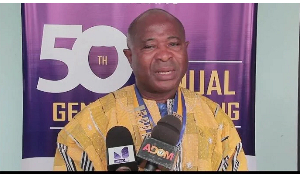 Vice President of Ghana Veterinary Medical Association, Dr. (Vet) Theophilus Odoom
Vice President of Ghana Veterinary Medical Association, Dr. (Vet) Theophilus Odoom
The Ghana Veterinary Medical Association (GVMA)has raised concerns over an alarming rate of veterinary doctors migrating to Europe due to poor working conditions.
Dr. (Vet) Theophilus Odoom, Vice President of Ghana Veterinary Medical Association said this in an interview with the media at the sidelines of the association’s 50th Biennial Conference in Koforidua.
“The few people that we have are willing to work, and because of lack of infrastructure and some of these things most of them are leaving the country. They are poaching them. The UK is poaching a lot of our young vets for meat inspections and service in the United Kingdom. Some are going to Australia and others so they keep leaving and it is making the work difficult”, Dr. (Vet) Theophilus Odoom indicated.
Under the theme “Strengthening Veterinary Services in Ghana for a Resilient Food System,” the three-day conference gathered veterinarians from across the country to discuss challenges, seek solutions, and set goals for sustainable growth.
The Veterinary Service Directorate, under Ghana’s Ministry of Food and Agriculture, is responsible for ensuring public health by controlling animal-borne diseases, supporting animal welfare, and protecting the health and safety of pets and zoological animals.
However, the directorate currently lacks the infrastructure, essential laboratories, and modern tools necessary for timely and accurate disease diagnosis—factors that directly impact the effectiveness of veterinary public health.
According to Dr. (Vet) Theophilus Odoom, Veterinarians need essential equipment such as laboratory tools and testing facilities at slaughterhouses to ensure the safety of the meat consumed by the public. He stresses that in many cases, veterinarians lack even basic tools for these inspections, making it difficult to safeguard public health effectively.
“Imagine that you employ a young vert. A young Doctor you ask to go to a slaughterhouse to make sure that the meat coming there is wholesome and not containing any contaminant but the person working there doesn’t have the requisite material to do the work what do you think the person will do? The person will feel frustrated”, Dr. Stephen Kofi Musah stated.
He urged the government to prioritize improvements in the veterinary sector by equipping veterinarians with modern technology, proper medical laboratories, and better working conditions.
He stressed that Ghana must take proactive steps to prevent diseases at the source rather than waiting for outbreaks to occur.
Dr. (Vet) Joseph Kofi Abuh. President Ghana Veterinary Medical Association urged the government to improve the condition of service of veterinarians in the country and improve infrastructure by ensuring that at least every region has a modern veterinary laboratory facility.
“Veterinary services staff work under harsh conditions, and their condition of services are very poor. Car maintenance and fuel allowance are being given to some category of health staff but veterinary service are not given”, Dr.(Vet) Joseph Kofi Buh stated.
He added “We have seen that Veterinary services over the past 30 years has not seen any improvement in infrastructure development. If you go to the districts the Veterinary clinics and offices are non-existent. Where they exist, they are in disrepair they have been lying for many years without any renovations.
“So we are calling on the government to improve our capacity labs. Each Region must have a veterinary lab. If in the districts we can have labs, poultry production hubs like Dormaa Ahenkro we are advocating that they should have labs”.
Zoonotic diseases—those that can be transmitted from animals to humans—are a major public health concern, as stated by the World Health Organization (WHO). Ghana, like other countries, is vulnerable to zoonotic diseases.
The outbreak COVID-19 pandemic, and Ebola among others call for strong veterinary public health services to prevent future outbreaks.
Hajia Habiba Yusif, Eastern Regional Director of Agriculture, also emphasized the impact of livestock diseases on agriculture, noting that strengthened veterinary services are essential for Ghana’s food security and agricultural productivity.
In response, Ike Apaw Gyasi, the Municipal Chief Executive of New Juaben South, acknowledged the association’s contributions to national development and pledged the government’s commitment to supporting veterinary services.
